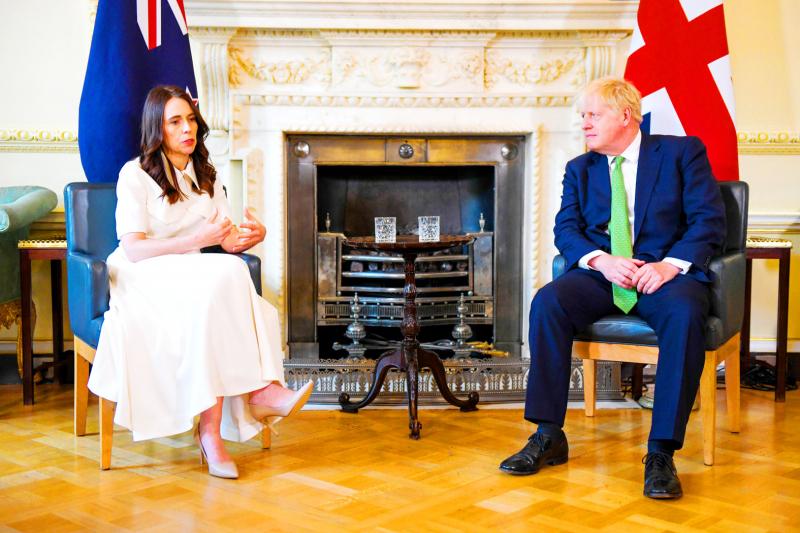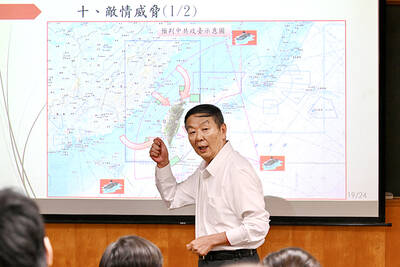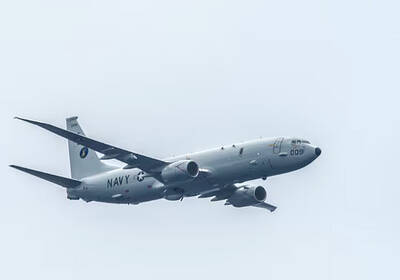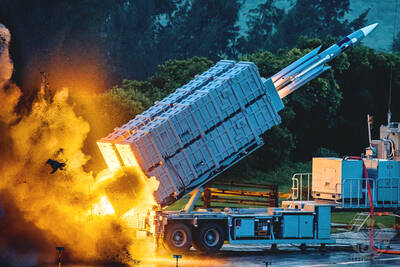The UK and New Zealand are committed to a stable Indo-Pacific region, and emphasize the importance of peace and stability across the Taiwan Strait, the leaders of the two countries said in a joint statement on Friday.
British Prime Minister Boris Johnson and New Zealand Prime Minister Jacinda Ardern issued the statement after meeting in London to discuss bilateral relations.
The UK and New Zealand “underscore the importance of peace and stability across the Taiwan Strait and encourage the peaceful resolution of cross-Strait issues via dialogue,” the statement said.

Photo: EPA-EFE
The two also expressed their commitment to peace and stability in the Indo-Pacific region, while voicing support for freedom of navigation and overflight in the South China Sea and beyond, in accordance with the UN’s Convention on the Law of the Sea.
They pledged to step up efforts to “support an international system that is based on the rule of law, free from illegal and unilateral aggression, and economic coercion, where human rights are upheld and the freedom and sovereignty of all countries are protected regardless of their size.”
The two expressed “grave concerns” over “the erosion of rights and freedoms in Hong Kong” as Chinese and Hong Kong authorities marked the 25th anniversary of the handover of the former British colony to Beijing on Friday.
Ardern was in the UK for the final leg of her visit to Europe.
She also addressed the NATO summit in Madrid on Thursday, expressing concern that China has become “more assertive and more willing to challenge international rules and norms.”
“We must stand firm on the rules-based order, call for diplomatic engagement, and speak out against human rights abuses at all times when and where we see them,” she said.
British Secretary of State for Foreign, Commonwealth and Development Affairs Liz Truss told the NATO summit on Wednesday that “the free world [should] work together to help ensure that Taiwan is able to defend itself.”
“I do think that with China extending its influence through economic coercion and building a capable military there is a real risk that they draw the wrong idea which results in a catastrophic miscalculation such as invading Taiwan,” Truss said.
Chinese Ministry of Foreign Affairs spokesman Zhao Lijian (趙立堅) at a news briefing on Thursday called Truss’ comments “irresponsible,” adding that the Chinese government had lodged a protest with the British government over the matter.

RETHINK? The defense ministry and Navy Command Headquarters could take over the indigenous submarine project and change its production timeline, a source said Admiral Huang Shu-kuang’s (黃曙光) resignation as head of the Indigenous Submarine Program and as a member of the National Security Council could affect the production of submarines, a source said yesterday. Huang in a statement last night said he had decided to resign due to national security concerns while expressing the hope that it would put a stop to political wrangling that only undermines the advancement of the nation’s defense capabilities. Taiwan People’s Party Legislator Vivian Huang (黃珊珊) yesterday said that the admiral, her older brother, felt it was time for him to step down and that he had completed what he

Taiwan has experienced its most significant improvement in the QS World University Rankings by Subject, data provided on Sunday by international higher education analyst Quacquarelli Symonds (QS) showed. Compared with last year’s edition of the rankings, which measure academic excellence and influence, Taiwanese universities made great improvements in the H Index metric, which evaluates research productivity and its impact, with a notable 30 percent increase overall, QS said. Taiwanese universities also made notable progress in the Citations per Paper metric, which measures the impact of research, achieving a 13 percent increase. Taiwanese universities gained 10 percent in Academic Reputation, but declined 18 percent

CHINA REACTS: The patrol and reconnaissance plane ‘transited the Taiwan Strait in international airspace,’ the 7th Fleet said, while Taipei said it saw nothing unusual The US 7th Fleet yesterday said that a US Navy P-8A Poseidon flew through the Taiwan Strait, a day after US and Chinese defense heads held their first talks since November 2022 in an effort to reduce regional tensions. The patrol and reconnaissance plane “transited the Taiwan Strait in international airspace,” the 7th Fleet said in a news release. “By operating within the Taiwan Strait in accordance with international law, the United States upholds the navigational rights and freedoms of all nations.” In a separate statement, the Ministry of National Defense said that it monitored nearby waters and airspace as the aircraft

UNDER DISCUSSION: The combatant command would integrate fast attack boat and anti-ship missile groups to defend waters closest to the coastline, a source said The military could establish a new combatant command as early as 2026, which would be tasked with defending Taiwan’s territorial waters 24 nautical miles (44.4km) from the nation’s coastline, a source familiar with the matter said yesterday. The new command, which would fall under the Naval Command Headquarters, would be led by a vice admiral and integrate existing fast attack boat and anti-ship missile groups, along with the Naval Maritime Surveillance and Reconnaissance Command, said the source, who asked to remain anonymous. It could be launched by 2026, but details are being discussed and no final timetable has been announced, the source